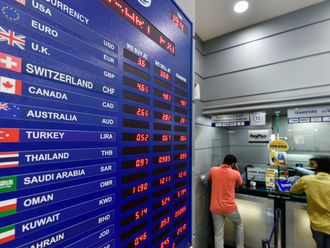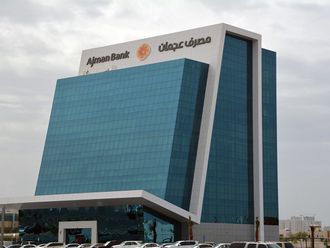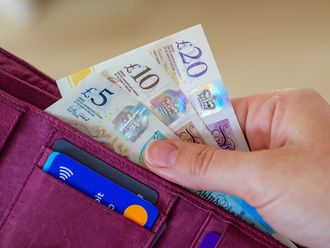Dubai: Collapse of global oil prices and the bleak outlook for recovery in the near future has given rise to wide speculation in the forex markets that at least some GCC countries may not be able to hold on to their currencies pegs to the dollar for very long.
The weakness of oil prices combined with the strength of the US dollar has given rise to speculation in the forwards market that Saudi Arabia in particular may adjust or abandon its long-standing currency peg against the dollar.
“We believe that the medium term costs of an exchange rate adjustment or de-peg in Saudi Arabia would outweigh any short term boost to government budget revenues in local currency terms,” said Khatija Haque, Head of Mena Research, Emirates NBD.
The large terms-of-trade shock resulting for continued fall in oil prices is clearly fuelling the debate that if the GCC pegs could break going forward. Despite such market speculation, economists and analysts believe there is no urgency for GCC governments to abandon the peg.
“We think that there are three aspects to consider when evaluating the future path of FX policy in the GCC: willingness, desirability, and ability to maintain the pegs. We believe all GCC countries share willingness and commitment to maintain unchanged FX policies. As for desirability, considerations should broadly favour the status quo to the extent that the fiscal costs attached to it can be managed, in our view,” said Jean-Michel Saliba, Mena Economist, Bank of America Merrill Lynch.
Policy stability
Key to the view that most countries are likely to keep the peg in the medium term is that a number of GCC countries still have sizeable foreign assets and many have started reforms to achieve fiscal sustainability. In addition historically, the peg has served the region as an anchor for policy stability.
Analysts in general consider that one of the greatest benefits of the pegged currency regime in the GCC is the limited transmission of oil-price volatility into these economies via currency movements. The dollar pegs anchor foreign exchange and inflation expectations. In addition a strong dollar keeps imported inflation low, benefiting domestic consumers. The argument in favour of weakening currencies to support exports also do not hold good for most of the GCC as most of its exports are hydrocarbon that is priced in dollars.
“The GCC pegs have proved to be successful nominal anchors, and even if they are adjusted rather than abandoned, this would add uncertainty about future adjustments, and ultimately make the pegs more vulnerable to speculative attacks. Devaluation of the exchange rate would also push up inflation across the region, eroding any short term boost to exports or the budget,” said Haque.
Analysts say gains from currency devaluation appear overstated given low FX elasticity of external and fiscal accounts. Historically currency pegs have permitted to the GCC run broadly low inflation, to simplify trade and financial transactions, and to reduce uncertainty as to the domestic value of oil export receipts. Competitiveness
The relatively low export diversification (apart from the UAE) suggests non-oil sector competitiveness matters in a stronger dollar environment are secondary in the short term. External stability is harder to assess as large current account surpluses during the oil boom partly reflect necessary intergenerational savings given finite oil resources. External deficits are thus the mirror image of this in the current situation.
“While a more flexible FX regime could allow the GCC to adjust to real shocks better, the gains in terms of room for conduct of independent monetary policy are curbed by existing institutional arrangements, underdeveloped instruments, as well as limited interest rate policy transmission mechanism, in our view. However, an upfront FX devaluation would prevent further depletion of FX reserve assets, especially if the willingness of authorities to implement sufficient fiscal consolidation is questioned,” said Saliba.
Factbox: UAE is in a strong position to defend peg
Although all GCC countries insist on their commitment to the dollar pegs, their ability to defend the arrangements in a sustained oil price slump varies greatly.
“Within the GCC, we believe Kuwait, Qatar and the UAE are still in a comfortable position given fiscal break even oil prices of $50-65/bbl and fiscal buffers that can cover deficits incurred under $30/bbl [Dh110] for 15-20 years,” said Jean-Michel Saliba, Mena Economist, Bank of America Merrill Lynch.
At the other end of the spectrum, Saudi Arabia, Bahrain and Oman are more challenged as fiscal buffers would be exhausted within five years under the same set of assumptions.
Oman appears most vulnerable given its low savings, high fiscal and external break even oil prices, need for material immediate fiscal cuts, start of debt monetisation operations last year (to the tune of 2 per cent of GDP), lack of political succession clarity and the about 10 per cent 1986 devaluation precedent.












